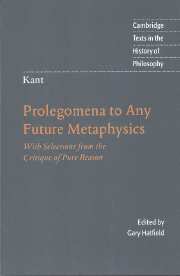Book contents
- Frontmatter
- Contents
- Acknowledgments
- Introduction
- Chronology
- Further reading
- Note on texts and translation
- Prolegomena to Any Future Metaphysics
- Table of Contents
- Preface
- Preamble
- General Question of the Prolegomena
- General Question
- The Main Transcendental Question, First Part
- The Main Transcendental Question, Second Part
- The Main Transcendental Question, Third Part
- Solution to the General Question of the Prolegomena
- Appendix
- Selections from the Critique of Pure Reason
- Index
- Cambridge texts in the history of philosophy
Solution to the General Question of the Prolegomena
Published online by Cambridge University Press: 05 June 2012
- Frontmatter
- Contents
- Acknowledgments
- Introduction
- Chronology
- Further reading
- Note on texts and translation
- Prolegomena to Any Future Metaphysics
- Table of Contents
- Preface
- Preamble
- General Question of the Prolegomena
- General Question
- The Main Transcendental Question, First Part
- The Main Transcendental Question, Second Part
- The Main Transcendental Question, Third Part
- Solution to the General Question of the Prolegomena
- Appendix
- Selections from the Critique of Pure Reason
- Index
- Cambridge texts in the history of philosophy
Summary
Metaphysics, as a natural predisposition of reason, is actual, but it is also of itself (as the analytical solution to the third main question proved) dialectical and deceitful. The desire to derive principles from it, and to follow the natural but nonetheless false illusion in their use, can therefore never bring forth science, but only vain dialectical art, in which one school outdoes another but none can ever gain legitimate and lasting approbation.
In order that metaphysics might, as science, be able to lay claim, not merely to deceitful persuasion, but to insight and conviction, a critique of reason itself must set forth the entire stock of a priori concepts, their division according to the different sources (sensibility, understanding, and reason), further, a complete table of those concepts, and the analysis of all of them together with everything that can be derived from that analysis; and then, especially, such a critique must set forth the possibility of synthetic cognition a priori through a deduction of these concepts, it must set forth the principles of their use, and finally the boundaries of that use; and all of this in a complete system. Therefore a critique, and that alone, contains within itself the whole well-tested and verified plan, and even all the means for carrying it out, by which metaphysics as science can be achieved; by any other ways or means it is impossible.
- Type
- Chapter
- Information
- Kant: Prolegomena to Any Future MetaphysicsWith Selections from the Critique of Pure Reason, pp. 119 - 125Publisher: Cambridge University PressPrint publication year: 1997
- 1
- Cited by



